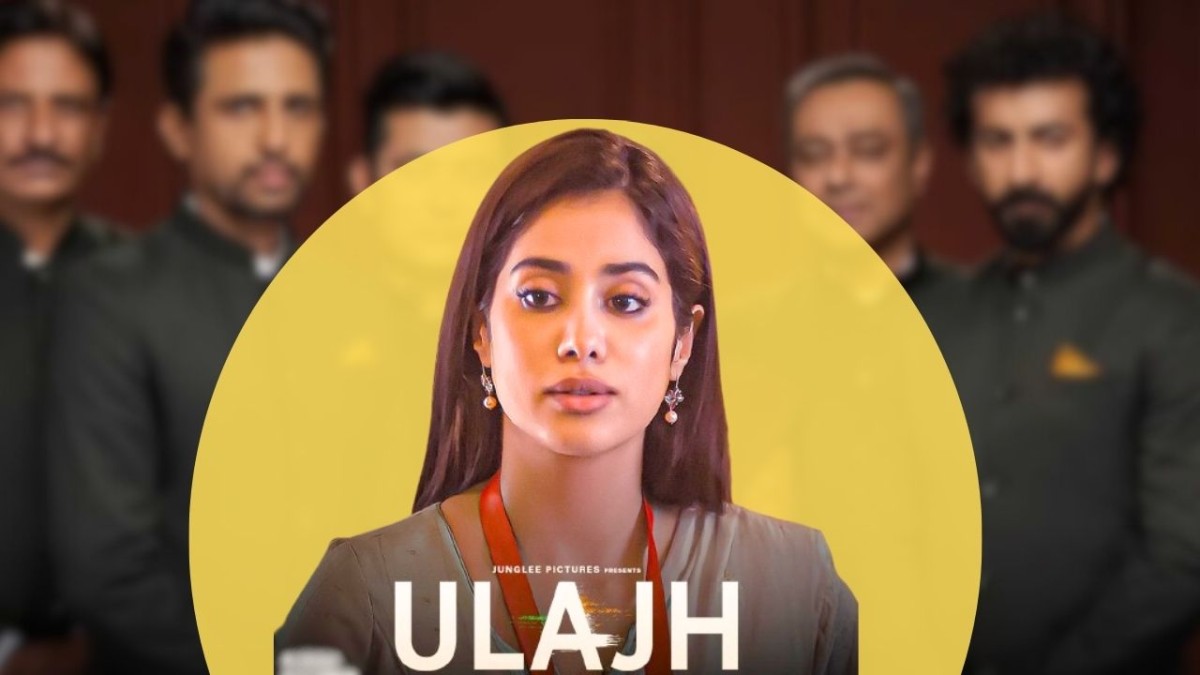
Ulajh: A Gripping Tale of Intrigue and Redemption, 2024
Ulajh Movie Review
Director – Sidhan Seria
Writer – Parveez Shaikh, Sudhanshu Seria, Atika Chohan
Cast – Janhvi Kapoor, Gulshan Davaiah , Roshan Mathew
Duration – 2H 30m
Available in – Theatre
“Ulajh,” directed by Sidhan Seria, is a cinematic journey that delves deep into the realms of intrigue, political espionage, and personal redemption. The film, which stars Janhvi Kapoor, Gulshan Devaiah, and Roshan Mathew, offers audiences a complex narrative interwoven with the challenges of diplomacy and personal conflict. With a runtime of 2 hours and 30 minutes, “Ulajh” manages to hold its ground as a serious political thriller, balancing intense drama with emotional depth.
Plot Overview
Set against the backdrop of international diplomacy, “Ulajh” follows the story of a young and idealistic diplomat, played by Janhvi Kapoor. Her character, Ayesha, is thrust into a web of political deceit and international intrigue when she takes on a challenging assignment in a volatile region. The film portrays Ayesha’s journey as she navigates the murky waters of global politics, balancing her personal ideals with the harsh realities of her profession.
Gulshan Devaiah’s character, Raghav, serves as Ayesha’s seasoned mentor, guiding her through the treacherous terrain of diplomacy. Roshan Mathew’s character, Imran, adds another layer of complexity to the plot, embodying a figure with ambiguous motives, leaving both Ayesha and the audience questioning his true intentions.
Performances
Janhvi Kapoor delivers a performance that showcases her growth as an actress. Her portrayal of Ayesha is nuanced, capturing the character’s idealism, vulnerability, and eventual transformation. Kapoor’s ability to convey a wide range of emotions makes Ayesha a relatable and compelling protagonist.
Gulshan Devaiah, as Raghav, brings a level of gravitas to the film. His experience and calm demeanor contrast sharply with Ayesha’s youthful enthusiasm, creating a dynamic mentor-mentee relationship that adds depth to the narrative. Devaiah’s performance is understated yet powerful, as he embodies a man who has seen the darker side of the world and is trying to shield Ayesha from it.
Roshan Mathew’s portrayal of Imran is equally impressive. His character is enigmatic, and Mathew expertly plays on the ambiguity of Imran’s intentions. His performance keeps the audience on edge, as they try to decipher his true motives throughout the film.
Direction and Writing
Sidhan Seria’s direction is sharp and focused. He masterfully crafts a story that is both thrilling and emotionally resonant. Seria’s ability to maintain a steady pace throughout the film is commendable, as the narrative unfolds with a sense of urgency that keeps the audience engaged.
The writing team, comprising Parveez Shaikh, Sudhanshu Seria, and Atika Chohan, deserves special mention. The script is layered with intricate details, reflecting the complexities of international diplomacy and the personal struggles of those who serve in such roles. The dialogues are crisp and to the point, often leaving the audience to read between the lines, adding to the film’s suspense.
Cinematography and Production Design
The cinematography in “Ulajh” is visually striking. The film’s settings, from the bustling streets of foreign cities to the grandeur of diplomatic offices, are captured beautifully. The cinematographer uses light and shadow effectively to enhance the mood of each scene, contributing to the overall tension and atmosphere of the film.
The production design is equally impressive. The attention to detail in recreating the world of diplomacy is evident in the meticulously designed sets, props, and costumes. The film’s aesthetic adds to its authenticity, making the audience feel as though they are truly immersed in the world of international politics.
Themes and Symbolism
At its core, “Ulajh” is a film about the moral dilemmas faced by those in positions of power. The title itself, which translates to “Entangled,” is symbolic of the complex web of choices and consequences that the characters must navigate. Ayesha’s journey is one of self-discovery, as she grapples with her ideals and the harsh realities of the world she has entered.
The film also explores themes of loyalty, betrayal, and the price of power. Each character represents a different aspect of these themes, and their interactions serve to highlight the often-blurred lines between right and wrong. The symbolism in “Ulajh” is subtle yet effective, with recurring motifs of entrapment and liberation reflecting the characters’ inner struggles.
Pacing and Narrative Structure
One of the strengths of “Ulajh” is its pacing. The film maintains a steady rhythm, gradually building tension as the plot unfolds. The narrative structure is non-linear at times, with flashbacks and parallel storylines adding depth to the characters’ backstories and motivations. This approach keeps the audience engaged, as they piece together the various threads of the plot.
The film’s climax is particularly well-executed, with the tension reaching its peak in a series of high-stakes confrontations. The resolution is satisfying, providing closure to the characters’ arcs while leaving the audience with lingering questions about the nature of power and morality.
Music and Sound Design
The music in “Ulajh” complements the film’s tone perfectly. The score, composed by an ensemble of musicians, is haunting and evocative, heightening the emotional impact of key scenes. The sound design is equally effective, with ambient noises and subtle audio cues adding to the film’s suspenseful atmosphere.
The use of music and sound is particularly noteworthy in scenes where silence is used to convey tension. The absence of sound in certain moments is just as powerful as the score itself, creating a sense of unease that lingers throughout the film.
Character Development
“Ulajh” excels in its portrayal of character development. Ayesha’s evolution from an idealistic diplomat to a seasoned professional is handled with care and attention to detail. The film takes the time to explore her inner conflict, allowing the audience to empathize with her struggles.
Raghav’s character arc is also well-developed, as he grapples with his own past and the choices he has made in his career. His relationship with Ayesha serves as the emotional core of the film, and their interactions provide some of the most poignant moments in the narrative.
Imran’s character remains an enigma throughout much of the film, but this ambiguity is intentional. His development is revealed gradually, keeping the audience guessing about his true intentions until the very end. This unpredictability adds to the film’s tension and makes his eventual revelation all the more impactful.
Social and Political Commentary
“Ulajh” is not just a political thriller; it is also a commentary on the nature of power and the ethical dilemmas faced by those who wield it. The film raises important questions about the responsibilities of diplomats and the impact of their decisions on the world stage.
The film also touches on issues of gender and power dynamics within the world of diplomacy. Ayesha’s journey is not just about navigating political intrigue but also about asserting her place in a male-dominated environment. The film handles these themes with nuance, offering a critique of the challenges faced by women in positions of power.
Audience Reception and Impact
“Ulajh” has received a positive reception from both critics and audiences alike. The film’s complex narrative and strong performances have been widely praised, with many noting its relevance in today’s political climate. The film has sparked discussions about the ethical responsibilities of diplomats and the often-opaque world of international relations.
The impact of “Ulajh” extends beyond its immediate narrative, as it encourages viewers to think critically about the nature of power and the choices made by those in positions of authority. The film’s ending, which leaves some questions unanswered, has also been a topic of debate, with audiences interpreting the final scenes in various ways.
Conclusion
“Ulajh” is a film that succeeds on multiple levels. It is a gripping political thriller that keeps the audience engaged from start to finish, while also offering a thoughtful exploration of the moral complexities of diplomacy. The strong performances by Janhvi Kapoor, Gulshan Devaiah, and Roshan Mathew, combined with Sidhan Seria’s skilled direction, make “Ulajh” a standout film in its genre.
The film’s ability to balance intense drama with emotional depth ensures that it resonates with audiences long after the credits roll. “Ulajh” is not just a story about political intrigue; it is a reflection on the human condition, the choices we make, and the price of power. As such, it is a film that deserves to be seen, discussed, and remembered





